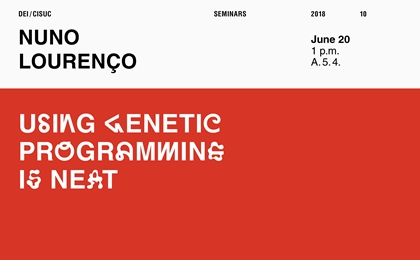
DEI/CISUC Seminars

June 19, Tuesday,
13h (sharp),
Room A.5.4. DEI-FCTUC
Invited Speaker: Nuno Lourenço
Title: "Using Genetic Programming is NEAT"
Abstract: The success of Artificial Neural Networks (ANNs) highly depends on their architecture and on how they are trained. However, making decisions regarding such domain specific issues is not an easy task, and is usually performed by hand, through an exhaustive trial-and-error process. Over the years, researchers have developed and proposed methods to automatically build and train ANNs. One example is the HyperNEAT algorithm, which relies on NeuroEvolution of Augmenting Topologies (NEAT) to create Compositional Pattern Production Networks (CPPNs). CPPNs are networks that encode the mapping between neuron positions and the synaptic weight of the ANN connection between those neurons. Although this approach has obtained some success, it requires meticulous parameterisation to work properly. In this talk we will compare different Evolutionary Computation methods to evolve Compositional Pattern Production Functions (CPPF). The CPPF are structures that have the same goal as CPPNs, but that are encoded as functions instead of networks. In addition to NEAT three methods are used to evolve such functions: Genetic Programming (GP), Grammatical Evolution, and Dynamic Structured Grammatical Evolution
Short-bio: Nuno Lourenço is an Assistant Professor (non-Tenure) at the University of Coimbra, where he obtained is PhD in Information Science and Technology in 2016. He has been with the Centre for Informatics and Systems of the University of Coimbra (CISUC) since 2009, as member of the Evolutionary and Complex Systems (ECOS) group. Formerly, he was appointed as a Senior Research Officer at the University of Essex in the United Kingdom. His main research interests are in the areas Bio-Inspired Algorithms, Optimisation and Machine Learning. He is the creator of Structured Grammatical Evolution, a genotypic representation for Grammatical Evolution, and participated in the proposal of a novel approach to automatically design Artificial Neural Networks (ANNs) using Evolutionary Computation called DENSER. He has authored and co-authored several articles in journals and top conferences from the Evolutionary Computation and Artificial Intelligence areas and he has been involved as a researcher in many national and international projects.